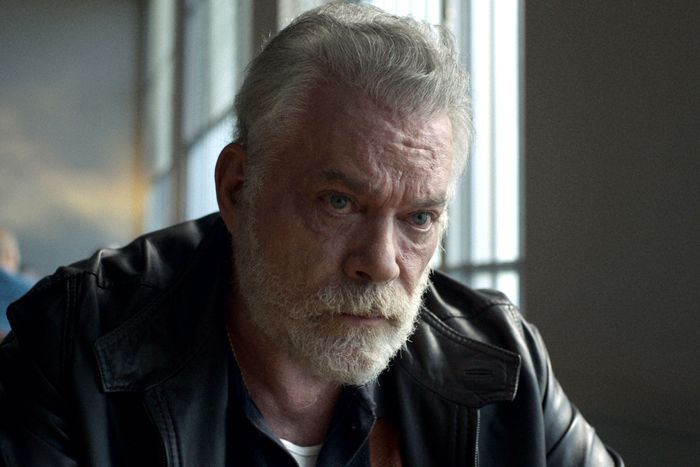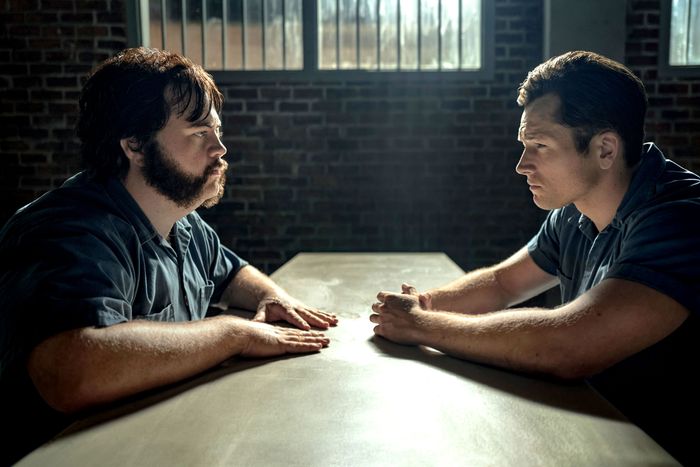
The Apple TV+ miniseries Black Bird is the kind of “inspired by actual events” true-crime story that thrives on the unbelievable. The entire premise, taken from the 2010 autobiographical novel In With the Devil: A Fallen Hero, A Serial Killer, and A Dangerous Bargain for Redemption, is mind-boggling: The U.S. government tasks a convicted drug dealer, Jimmy Keene (Taron Egerton), with going undercover in another prison, befriending a suspected serial killer, Larry Hall (Paul Walter Hauser), and coaxing from him the location of his victims’ bodies. As a narrative baseline, that’s already pretty wild, and then there are the myriad astonishing details that creator Dennis Lehane emphasizes throughout these six episodes, like how Hall was able to ingratiate himself into the investigations of missing and murdered girls, the way the police fumbled the cases over and over again, and how federal agents basically abandoned Keene once he started his mission.
Amid all that shock, Black Bird needs a grounding force — someone who shares our astonishment at all this, but keeps the story focused on the human lives being moved around like so many chess pieces. In one of his final roles before he passed in May, Ray Liotta provides that poignancy and that pathos. Liotta isn’t exactly a co-lead alongside Egerton (who is never quite believable enough as tough guy Jimmy) and Hauser (ratcheting up his I, Tonya performance to genuinely unsettling levels of whispering menace), but he’s a magnetic pull in every scene he’s in. The humanity Liotta brings to Keene’s father, Big Jim, is multifaceted and sobering, and it cuts through the more irritating aspects of Black Bird to remind what a great actor can do with any amount of screen time.
Black Bird begins with one of those irritations: First-person voice-over narration from Keene inserts us into the “life I knew” as a wealthy drug dealer in Chicago circa 1996 and introduces us to the silent but watchful Jessica Roach (Laney Stiebing), a teenage girl whose death eventually becomes Keene’s business. “Things you don’t think are connected actually are,” Keene says, and that frankly unnecessary direct-address approach suggests early on that Egerton might not be the right fit for this role. Keene is presented as a guy with an obsessive need to prove himself and a certain ruthlessness in doing so, and Egerton’s nice-guy quality shines through distractingly. Black Bird tries to emulate The Night Of in presenting Egerton as a fish out of water a la Riz Ahmed’s Naz, but he vacillates between too sensitive and too puffy-chested, with a put-upon, Conor McGregor–esque physicality. Perhaps this obvious mimicry is because Keene’s artifice will eventually fall away, but the initial impact is similar to how Seth Rogen never felt quite right in his Pam & Tommy role.
Former football star and unrepentant Lothario Keene ends up betrayed, arrested, and sent to prison for ten years. His sentence shocks his father, former police officer Big Jim (Liotta, elevating the art of aghast reactions), but for federal agent Lauren McCauley (Sepideh Moafi), it’s an opportunity. For years, she and Illinois cop Brian Miller (Greg Kinnear) have been trying to tie their suspect, Hall, to Roach and 13 others. Hall is currently serving time for one crime, but he denies all these charges, instead claiming that he just dreams of kidnapping and killing and isn’t actually responsible. In exchange for a commuted sentence, McCauley and Miller want the gregarious Keene to find a way to make Hall talk before he qualifies for parole, and share with him where the other bodies are buried. But no confession, no deal.
With that exchange driving the narrative, Black Bird primarily follows Keene as he’s trained by McCauley for the assignment, struggles to make a place for himself in the maximum-security prison he’s relocated to in Missouri, withers under the weight of Big Jim’s worries and regrets, and eventually connects with Hall, chatting about their childhoods and Hall’s disturbing attraction to tweens and teens. Egerton and Hauser are hard to look away from in those latter tête-à-tête interactions, with the former’s eagerness and the latter’s obfuscation making for effective tension. (Hauser’s facial expressions, in particular how his averted eyes complement his stilted line deliveries and then snap into focus when he’s excitedly discussing his interactions with his victims, do a lot to communicate Hall’s intentionally bifurcated personality.) Egerton and Moafi share an excellent scene in which she asks him over and over again what he likes about women, an exercise that illuminates Keene’s me-first mentality while also broadly indicting toxic masculinity. Also well done are sequences that switch perspective between Keene’s subjectivity and the series’ objectivity to illuminate the gap between the paranoia Keene feels in prison and the way he’s actually fairly ignored, and conversations between Keene and a lifer mobster (played by the fantastic character actor Tony Amendola) about the importance of friendships in prison over games of bocce.
Otherwise, though, Black Bird leans a little too much on generic “prison is dangerous” clichés, and that overreliance gives the back half of the miniseries a stilted pace and a jarring, nearly anticlimactic ending. But those final episodes also include some of Liotta’s most affecting scenes as Big Jim, and those are what make Black Bird ultimately worthwhile. From the moment he’s introduced in the series, talking to Egerton’s Keene through a glass pane that visually divides their faces into half-slices of generational pain, Liotta embodies the series’ sense of opportunities lost. The years show on the wrinkles and crags of his face and in the croak of his voice, and Liotta wields both to communicate Big Jim’s initially flabbergasted reaction to the predicament his son has found himself in and his unwavering loyalty to protecting him.
“I never wanted this for you. I wanted a totally different deal” is a predictable line for this kind of show, but Liotta’s power as an actor was always his ability to rise above expectations of genre, narrative, or identity. In Black Bird, a series wholly concerned with our ability to lie, that ability to embody honesty and vulnerability is what stands out most.






